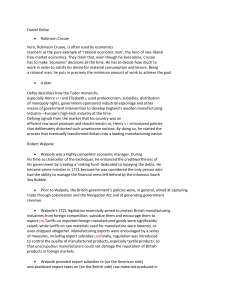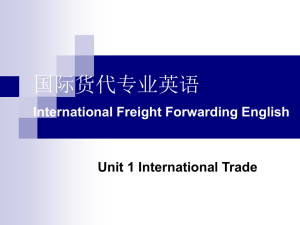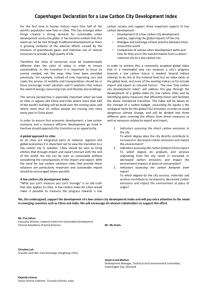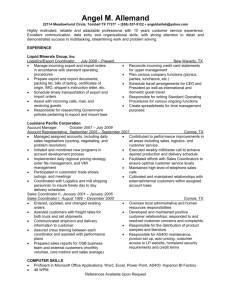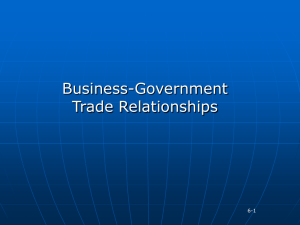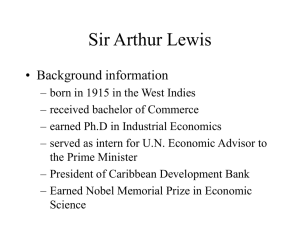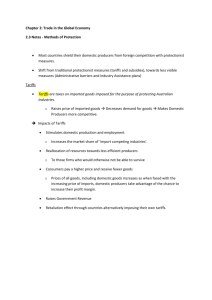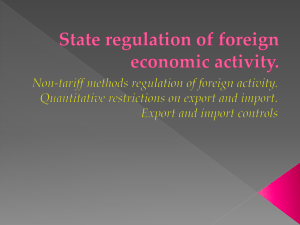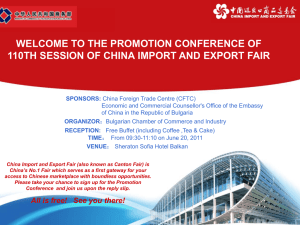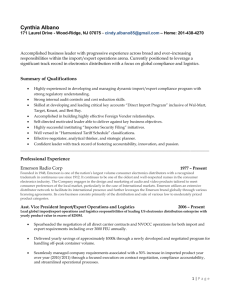Foreign Trade Barriers - Virginia Economic Development Partnership
advertisement
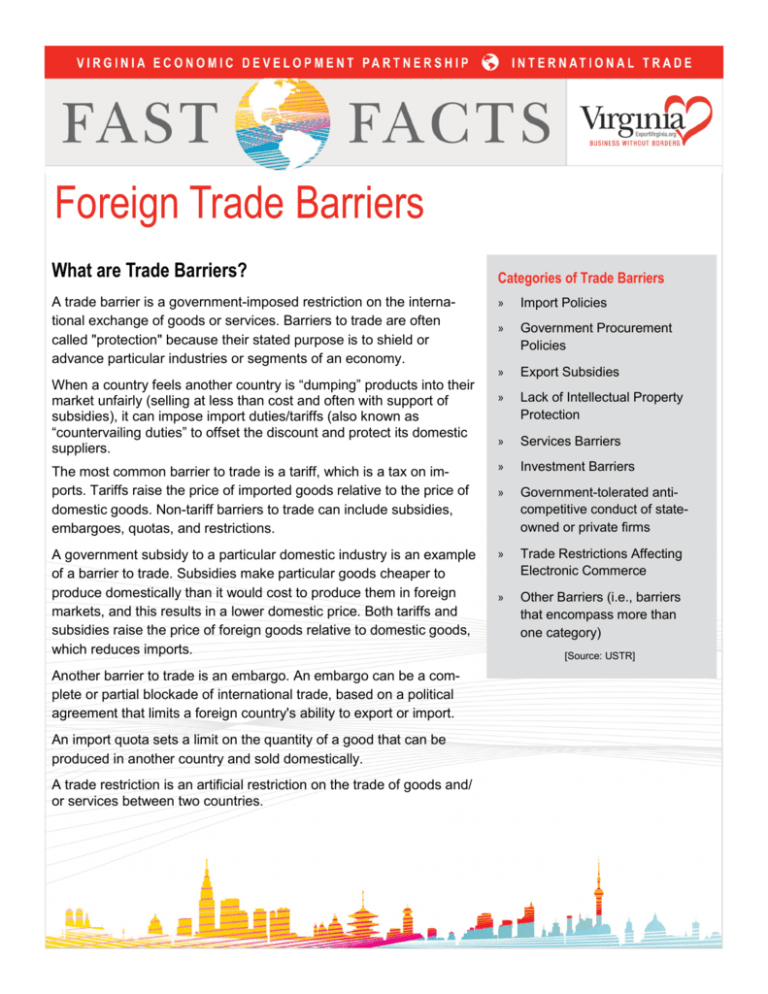
Foreign Trade Barriers What are Trade Barriers? A trade barrier is a government-imposed restriction on the international exchange of goods or services. Barriers to trade are often called "protection" because their stated purpose is to shield or advance particular industries or segments of an economy. Categories of Trade Barriers » Import Policies » Government Procurement Policies » Export Subsidies » Lack of Intellectual Property Protection » Services Barriers The most common barrier to trade is a tariff, which is a tax on imports. Tariffs raise the price of imported goods relative to the price of domestic goods. Non-tariff barriers to trade can include subsidies, embargoes, quotas, and restrictions. » Investment Barriers » Government-tolerated anticompetitive conduct of stateowned or private firms A government subsidy to a particular domestic industry is an example of a barrier to trade. Subsidies make particular goods cheaper to produce domestically than it would cost to produce them in foreign markets, and this results in a lower domestic price. Both tariffs and subsidies raise the price of foreign goods relative to domestic goods, which reduces imports. » Trade Restrictions Affecting Electronic Commerce » Other Barriers (i.e., barriers that encompass more than one category) When a country feels another country is “dumping” products into their market unfairly (selling at less than cost and often with support of subsidies), it can impose import duties/tariffs (also known as “countervailing duties” to offset the discount and protect its domestic suppliers. Another barrier to trade is an embargo. An embargo can be a complete or partial blockade of international trade, based on a political agreement that limits a foreign country's ability to export or import. An import quota sets a limit on the quantity of a good that can be produced in another country and sold domestically. A trade restriction is an artificial restriction on the trade of goods and/ or services between two countries. [Source: USTR] Types of Trade Barriers The Office of the United States Trade Representative (USTR) classifies foreign trade barriers into nine categories which cover government-imposed measures and policies that restrict, prevent, or impede the international exchange of goods and services. They include: » Import Policies: tariffs and other import charges, quantitative restrictions (such as a quota), import licensing, and customs barriers; » Government Procurement: “buy national” policies and closed bidding; » Export Subsidies: export financing on preferential terms and agricultural export subsidies that displace U.S. exports in third country markets; » Lack of Intellectual Property Protection: inadequate patent, copyright, and trademark regimes and enforcement of intellectual property rights; » Services Barriers: limits on the range of financial services offered by foreign financial institutions, regulation of international data flows, restrictions on the use of foreign data processing, and barriers to the provision of services by foreign professionals; » Investment Barriers: limitations on foreign equity participation and on access to foreign governmentfunded research and development programs, local content requirements, technology transfer requirements and export performance requirements, and restrictions on repatriation of earnings, capital, fees and royalties; » Government-tolerated anticompetitive conduct of state-owned or private firms: restricts the sale or purchase of U.S. goods or services in the foreign country’s markets; » Trade Restrictions Affecting Electronic Commerce: tariff and nontariff measures, burdensome and discriminatory regulations and standards, and discriminatory taxation; and » Other Barriers: barriers that encompass more than one category, such as bribery and corruption, or that affect a single sector. Assistance with Trade Barriers The World Trade Organization (WTO) deals with the global rules of trade between nations, and its main function is to ensure that trade flows as smoothly, predictably and freely as possible. The WTO provides a framework for negotiating and formalizing trade agreements, and a dispute resolution process aimed at enforcing participants' adherence to WTO agreements. If problems arise, the U.S. Department of Commerce operates the Trade Compliance Center and the Advocacy Center. The Trade Compliance Center (TCC), in the U.S. Department of Commerce's International Trade Administration, is the U.S. Government's focal point for monitoring foreign compliance with trade agreements to see that U.S. firms and workers get the maximum benefits from these agreements. The Advocacy Center helps to ensure that sales of U.S. products and services have the best possible chance competing abroad. Advocacy assistance is wide and varied but often involves companies that want the U.S. Government to communicate a message to foreign governments or government-owned corporations on behalf of their commercial interest, typically in a competitive bid contest. International Inquiries: (804) 545-5700 P.O. Box 798, 901 East Byrd Street, Richmond, VA 23218-0798 ExportVirginia.org Virginia Economic Development Partnership - International Trade offers a number of export-related services to Virginia businesses, including trade missions and market research by our Global Network of in-country consultants. These services are available to all Virginia exporters. For more information, please visit our website: ExportVirginia.org Additional Resources World Trade Organization Centre William Rappard, Rue de Lausanne 154, CH-1211 Geneva 21, Switzerland Tel: +41 (0)22 739 51 11 Fax: +41 (0)22 731 42 06 Email: enquiries@wto.org Trade Compliance Center Market Access and Compliance/ITA U.S. Department of Commerce 14th Street and Constitution Avenue, NW Washington, D.C. 20230 Tel: (202) 482-1191 Fax: (202) 482-6097 Email: tcc@trade.gov Office of the United States Trade Representative 600 17th Street NW Washington, DC 20508 Tel: 202-395-2839 Fax: 202-395-2961 The Advocacy Center U.S. Department of Commerce 14th Street & Constitution Avenue, N.W., Rm. 2840 Washington, DC 20230 Tel: (202) 482-3896 Last Revised: August 19, 2013 Information provided by VEDP Fast Facts is intended as advice and guidance only. The information is in no way exhaustive and the VEDP is not a licensed broker, banker, shipper or customs agency. VEDP shall not be liable for any damages or costs of any type arising out of, or in any way connected with the use of, these Fast Facts.
